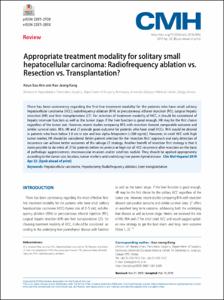Appropriate treatment modality for solitary small hepatocellular carcinoma: Radiofrequency ablation vs. Resection vs. Transplantation?
- Keimyung Author(s)
- Ahn, Keun Soo; Kang, Koo Jeong
- Department
- Dept. of Surgery (외과학)
- Journal Title
- Clinical and Molecular Hepatology
- Issued Date
- 2019
- Abstract
- There has been controversy regarding the first-line treatment modality for the patients who have small solitary hepatocellular carcinoma (HCC); radiofrequency ablation (RFA) or percutaneous ethanol injection (PEI), surgical hepatic resection (HR) and liver transplantation (LT). For selection of treatment modality of HCC, it should be considered of hepatic reservoir function as well as the tumor stage. If the liver function is good enough, HR may be the first choice regardless of the tumor size. However, recent studies comparing RFA with resection showed comparable outcome and similar survival rates. RFA, HR and LT provide good outcome for patients who have small HCCs. RFA would be desired in patients who have below 3.0 cm in size and low alpha-fetoprotein (<200 ng/mL). However, in small HCC with high tumor marker, HR should be considered. Better patient selection for the ‘resection first’ approach and early detection of recurrence can achieve better outcomes of the salvage LT strategy. Another benefit of resection first strategy is that it make possible to do enlist of LT for patients before recurrence at high risk of HCC recurrence after resection on the basis of pathologic aggressiveness, microvascular invasion and/or satellites nodule. They should be applied appropriately according to the tumor size, location, tumor markers and underlying liver parenchymal disease
- Publisher
- School of Medicine (의과대학)
- Citation
- Keun Soo Ahn and Koo Jeong Kang. (2019). Appropriate treatment modality for solitary small hepatocellular carcinoma: Radiofrequency ablation vs. Resection vs. Transplantation? Clinical and Molecular Hepatology. doi: 10.3350/cmh.2018.0096
- Type
- Article
- ISSN
- 2287-285X
- Source
- https://www.e-cmh.org/journal/view.php?doi=10.3350/cmh.2018.0096
- Appears in Collections:
- 1. School of Medicine (의과대학) > Dept. of Surgery (외과학)
- 파일 목록
-
-
Download
 oak-2019-0118.pdf
기타 데이터 / 332.33 kB / Adobe PDF
oak-2019-0118.pdf
기타 데이터 / 332.33 kB / Adobe PDF
-
Items in Repository are protected by copyright, with all rights reserved, unless otherwise indicated.